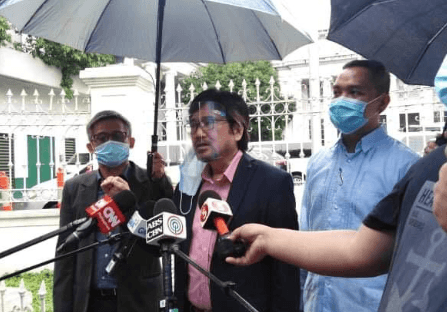SUMMARY
This is AI generated summarization, which may have errors. For context, always refer to the full article.

Progressive group Sanlakas party list filed on Monday, July 13, the 8th petition against the anti-terror law, focusing its argument on the vagueness and subjectivity of the definition of a terroristic dissent.
The petition asked that Section 4 of the law be struck down for being unconstitutional, and meanwhile asked for a temporary restraining order or TRO to be issued against the implementation of Section 4.
Section 4 is the provision that defines terrorism, and has an exemption that says dissent is excluded from terrorism except if it has an “intent to cause death or serious physical harm to a person, to endanger a person’s life, or to create a serious risk to public safety.”
SECTION 4: “Provided, That, terrorism as defined in this Section shall not include advocacy, protest, dissent, stoppage of work, industrial or mass action, and other similar exercises of civil and political rights, which are not intended to cause death or serious physical harm to a person, to endanger a person’s life, or to create a serious risk to public safety (emphasis ours).”
Sanlakas called this a “double negative formulation” that is subjective and “highly dependent on the perception of the situation or facts by the law enforcement agent or military personnel.”
Critics have slammed this as a “killer” caveat, although the bill’s sponsors refer to this as a safeguard.
Human Rights Commissioner Leah Tanodra Armamento said the way the law was written has made dissent part of the general rule of terrorism, and the burden of proof to show there was no terror intent will shift from the prosecutor to the suspect. (READ: Beware of that two-faced clause in the anti-terror law)
Section 4 has also expanded the definition of terrorism as common crimes to include destabilization of social structures of government and provoking the government by intimidation. (READ: EXPLAINER: Comparing dangers in old law and anti-terror bill)
“If a person, as his way of protest, denounces the President on social media for his poor handling of the pandemic, the act of that person can be perceived as putting the President’s life in danger (because of the public hatred it will tend to generate), thereby intending to ‘provoke’ the government, which will place the act within the law’s definition of terrorism,” said Sanlakas. (READ: WATCH: The dangers of the Anti-Terrorism Law)
Sanlakas said this falls under the rule of void for vagueness.
“The prohibition of vagueness in criminal statutes ‘is a well-recognized requirement, consonant alike with ordinary notions of fair play and the settled rules of law,’ and a statute that flouts it ‘violates the first essential of due process,'” said the petition.
There are at least a dozen groups that will be filing petitions against the anti-terror law. Bulk of the next petitions are expected next week after the law is presumed to take effect on July 18, or 15 days since the law’s signing on July 3.
Below is a list of petitions that have been filed so far:
- Atty Howie Calleja and group
- Albay 1st District Representative Edcel Lagman
- Far Eastern University Institute of Law
- Makabayan bloc
- Former OGCC chief Rudolf Jurado
- Center for Trade Union and Human Rights
- Framers of the Constitution with Ateneo and Xavier lawyers
- Sanlakas party list
– Rappler.com
Add a comment
How does this make you feel?
There are no comments yet. Add your comment to start the conversation.